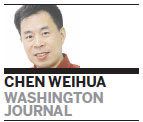While a potential rivalry between China and the United States has long been in the media spotlight, what has happened in the past weeks underlines the importance of their cooperation for shared interest.
That includes everything from fighting climate change and counterterrorism to coping with the deadly Ebola virus and stimulating global economic growth.
Last Friday, US Assistant Secretary for East Asian and Pacific Affairs Daniel Russel said President Barack Obama believes that the US-China relationship is important to both countries, to the region and to the international community, given the size and scope of their economies, of their capabilities and their interests.
He was talking about Obama's upcoming November trip to China to attend the APEC leaders' summit, followed by a one-day visit for bilateral talks with Chinese leaders.
The world's two largest greenhouse emitters were the focus of attention last week at the annual United Nations gathering. China, with its rapid economic growth, has experienced a dramatic increase in carbon emissions in recent years despite its ambitious goals and bold actions in the green revolution. Such efforts are still far from enough as severe pollution becomes a major source of complaints from China residents.
On the other hand, Obama spoke eloquently about the fight on climate change. He has used executive orders to push for a green revolution in the US. Yet, the lack of cooperation from the Congress, where there are plenty of deniers of global warming, has greatly handicapped Obama's efforts in making the US a leader on this front.
Last Friday's data from the US Department of Energy showed that US factories and power plants discharged more carbon dioxide into the atmosphere during the first half of this year compared with the same period in each of the past two years.

Summits between Xi and Obama in the past have been successful in this front, as they agreed during their informal meeting in Sunnylands, California, more than a year ago, to work together in phasing out the consumption and production of hydrofluorocarbons (HFCs), potent greenhouse gases.
On the counterterrorism side, Obama had tried hard last week to rally support at the UN for a war on the Islamic State. Yet from China's point of view, Washington needs to pay more attention to a political solution rather than depending excessively on a military one. China has long held a policy of non-interference in other nation's internal affairs. Many Chinese feel uncomfortable with Obama looking more like George W. Bush when he ordered airstrikes on sovereign Syria.
Nevertheless, the growing terrorist threat in China posed by Xinjiang separatists, many of whom trained and are linked with Islamic extremist groups, suggest that China and the US could have much room for cooperation.
It's clear to many Chinese that the US has been exercising double standards in its war on terror, especially regarding those violent Xinjiang separatists who have conducted bombings and attacks against innocent Chinese civilians. Russian Foreign Minister Sergey Lavrov voiced similar concerns last week when he warned the US not to divide terrorists into good terrorists and bad terrorists.
The US has been leading the fight against Ebola. China, which has a growing presence in Africa, has also stepped up its assistance to several West African nations.
There are many other issues of common interest. For example, as economists from the International Monetary Fund, Brookings and Peterson Institute met last Friday, they all agreed that China's economic reform and growth will have a strong global impact, including on the US.
Given these common interests and challenges, many observers feel that too much attention has been paid to the differences in the past year, such as the tensions in South and East China seas, cyber security and military encounters in the sea and air.
Undoubtedly, many of the differences are unlikely to be resolved in the near term. But it does put to the test the ability of China and the US to manage and control their differences and prevent them from spilling over into the overall relationship.
Wu Jianmin, former Chinese vice-foreign minister and now a member of the Foreign Policy Advisory Committee of the ministry, expressed his view on the China US Focus website this month that the bilateral relationship is basically good, citing the strong economic and trade bond and the many mechanisms for bilateral consultations and the goodwill extended in the new type of major country relationship concept.
Russel, the top US diplomat for East Asia, described the Obama-Xi discussions he witnessed in the past as "substantive and direct". Given that National Security Advisor Susan Rice has already declared Obama's upcoming trip to China to be a milestone, it raises new hope for the two nations' leaders to show more wisdom and courage in maximizing cooperation and effectively managing and controlling differences.
Contact the writer at chenweihua@chinadailyusa.com.
(China Daily USA 09/29/2014 page2)
